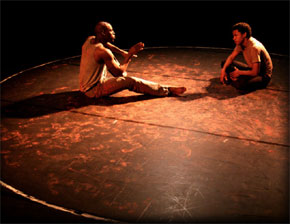 I am currently sat in the Art Cafe at St Luke’s Church, Redcliffe Gardens. Ambient music plays in the background as quotes from Bob Dylan, Charlie Chaplin and other artists inspire conversation from the screen. Every thirty minutes a short film (see ‘London Calling (A Little Interruption)’ post) punctuates the relaxed atmosphere with thumping beats of Moby and fast paced images aimed to evoke conversation. My remit for this afternoon, like yesterday, is to sit looking arty and relaxed to encourage any guests to do the same (maybe not look arty!)
I am currently sat in the Art Cafe at St Luke’s Church, Redcliffe Gardens. Ambient music plays in the background as quotes from Bob Dylan, Charlie Chaplin and other artists inspire conversation from the screen. Every thirty minutes a short film (see ‘London Calling (A Little Interruption)’ post) punctuates the relaxed atmosphere with thumping beats of Moby and fast paced images aimed to evoke conversation. My remit for this afternoon, like yesterday, is to sit looking arty and relaxed to encourage any guests to do the same (maybe not look arty!)
It has been an interesting journey to this point (see ‘London Calling (part IV)’ post) and one that has made me consider where I am in terms of outreach and evangelism.
I have become increasingly aware that I speak from a very post modern mindset; one that sits within a place of questions, of suspicion to authoritarian proclamations and one who enjoys the process rather than the result. Outreach has become more and more about a relationship, and my passion lies in people experiencing faith rather than having it explained. Too often we revert to a mode of evangelism that explains how people can get faith rather than encouraging people to experience what we have experienced.
The Art Cafe, for me, should always have been a space to experience the peace of God, His fingerprints in the expression of His children and His love calling them in a time of quiet. It was not a place where we welcome people in to ‘explain’ our faith and tell people what we think. Charlie Chaplin, on the screen in front of me says;
‘We think too much and feel too little.’
It so true at this time. This culture is tired of hearing what people think, of what someone, who doesn’t know what we’re going through, what we’ve felt, tell us how it is. We shut our ears to the reason of others because it has been destructive in the past. We yearn to feel.
This is, of course, a very post modern view point and I am aware that many around me don’t believe the same but as I have struggled with the original vision of this Art Cafe, those who engage with art don’t want to be told what to think; the one right interpretation of a piece, they would rather discover for themselves the emotions being drawn from them. They enjoy seeing something for them, connecting with an expression of the human condition. What makes a masterpiece, a timeless classic? The multi-facetted nature, the expression of something that defies time and place and becomes something everyone can engage with again and again.
As ‘Charlie’s’ face, cheekily smiles down at me I think about his films and how every time i see them I capture a better understanding of humanity and myself and there’s a profound exchange taking place. I think of my process of preparation for a sermon/talk and how I long to express my passion or pain or emotional response to a passage or truth in the hope that God would make it accessible for all people who have known what it is to live. For me, it’s not about making cultural reference to explain a meaning in a passage it is more about me putting people in a place where they can experience the truth of the story to place their story into God’s story.
I’m going to make this short as I need to go and open the doors to the public and welcome people to come enjoy this space, explore their own creativity and engage in conversation with themselves and the art around them. May God bless everyone who visits here with space to ‘be’ and speak to them in their silence through the art.






